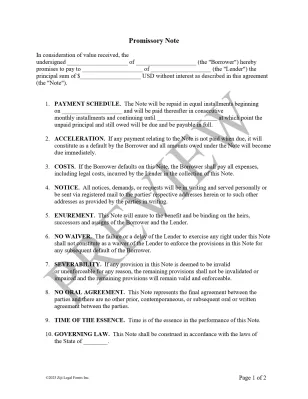Get started with your

Free Promissory Note
A legal document between the lender and the borrower, where the borrower promises to repay a loan to the lender.
A promissory note is a legal financial instrument, sometimes referred to as a note payable, that contains a written promise by the borrower to pay the lender a determinate sum of money, either at a fixed or determinable future time or on demand.
Click Create Document and let us get you started with your promissory note. Just answer a few simple questions, revise as many times as you want and download your free PDF within minutes.

SIMPLE
STEPS
STEPS
Answer simple questions
Review and download your document
Print and sign instantly
